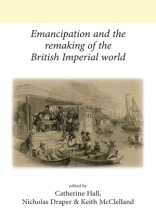Slavery and the slavery business have cast a long shadow over British history. In 1833, abolition was heralded as evidence of Britain’s claim to be the modern global power. Yet much is still unknown about the significance of the slavery business and emancipation in the formation of modern imperial Britain. This book engages with current work exploring the importance of slavery and slave-ownership in the re-making of the British imperial world after abolition in 1833.
The contributors to this collection, drawn from Britain, the Caribbean and Mauritius, include some of the most distinguished writers in the field: Clare Anderson, Robin Blackburn, Heather Cateau, Mary Chamberlain, Chris Evans, Pat Hudson, Richard Huzzey, Zoë Laidlaw, Alison Light, Anita Rupprecht, Verene A. Shepherd, Andrea Stuart and Vijaya Teelock.
The impact of slavery and slave-ownership is once again becoming a major area of historical and contemporary concern: this book makes a vital contribution to the subject.
Cuprins
Introduction – Catherine Hall, Nicholas Draper and Keith Mc Clelland
Part I: Formations of capital: beyond ‘merchants and planters’
1. The scope of accumulation and the reach of moral perception: slavery, market revolution and Atlantic capitalism – Robin Blackburn
2. Slavery, the slave trade and economic growth: a contribution to the debate – Pat Hudson
3. Slavery and Welsh industry before and after emancipation – Chris Evans
Part II: From slavery to indenture
4. From slavery to indenture: scripts for slavery’s endings – Anita Rupprecht
5. Re-examining the labour matrix in the British Caribbean, 1750–1850 – Heather Cateau
6. After emancipation: empires and imperial formations – Clare Anderson
Part III: The imperial state
7. Imperial complicity: indigenous dispossession in British history and history writing – Zoë Laidlaw
8. Concepts of liberty: freedom, laissez faire and the state after Britain’s abolition of slavery – Richard Huzzey
Part IV: Public histories, family histories
9. Family history: history’s poor relation? – Alison Light
10. Writing Sugar in the Blood – Andrea Stuart
11. Legacy and lineage: family histories in the Caribbean – Mary Chamberlain
Part V: Reparations, restitution and the historian
12. The Mauritius Truth and Justice Commission: ‘eyewash’, ‘storm in a teacup’ or promise of a new future for Mauritians? – Vijaya Teelock
13. Jamaica and the debate over reparation for slavery: an overview – Verene A. Shepherd
Index
Despre autor
Nicholas Draper is a Research Associate in the Department of History, University College London












